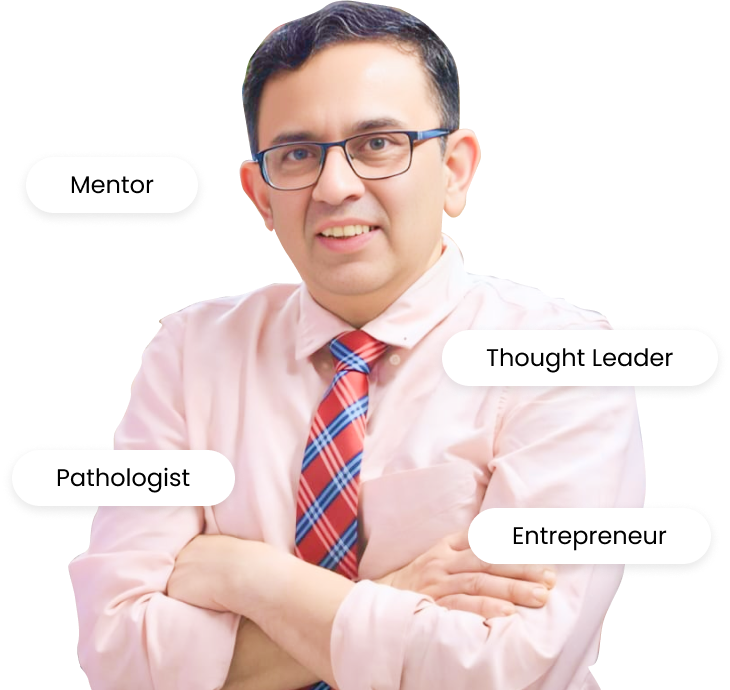Where Pathology Meets Vision & Innovation
With 29+ years of experience in diagnostics, medical education, and healthcare leadership, I bring a unique blend of clinical expertise, mentoring, and strategic consulting to the medical community. My work is rooted in the belief that excellence in diagnostics is the foundation of better healthcare outcomes.

“I believe healthcare is more than just technology or test results — it’s about connecting knowledge with empathy, leadership with vision, and science with purpose.”
Dr. Arpan Gandhi

About Me
I am a pathologist with nearly three decades of professional experience in diagnostic medicine, healthcare leadership, and medical education. Over these years, my journey has taken me from leading large laboratory networks to guiding start-up ventures in diagnostics, each phase shaped by the same purpose: advancing the role of pathology in patient care.
I have held senior leadership roles at various diagnostic ventures. These opportunities gave me insights not only into the science of diagnostics but also into the art of building sustainable healthcare organizations. They taught me how to balance clinical excellence with operational strategy, and how to ensure that patients always remain at the center of medical decision-making.
Beyond my administrative and consulting responsibilities, my deepest passion lies in teaching and mentorship. I have been fortunate to guide more than 200 residents, young pathologists, and ophthalmic personnel, helping them develop skills, confidence, and a spirit of inquiry. For me, teaching is not just about transmitting knowledge but about shaping mindsets — cultivating curiosity, discipline, and empathy in the next generation of healthcare professionals.
Core Expertise
Pathology & Diagnostics
Specializing in ocular pathology, oncology, and advanced diagnostic medicine.
Consulting & Collaborations
Guiding laboratory set-ups, healthcare ventures, and diagnostic strategy for institutions.
Teaching & Mentorship
Developing structured teaching modules for residents, fellows, and ophthalmic personnel.
Research & Innovation
Building rare case archives, advancing clinicopathological correlations, and exploring AI in diagnostics.
29+
years in healthcare and diagnostics
Leadership Roles
at Various locations and Diagnostic firms..
Mentored
over 200 residents and young pathologists
Collaborations
across 20+ countries
Advocate for
digital pathology, research integration, and medical education reform
Life Journey
Over the years, my professional journey has taken me through diverse roles across the diagnostic industry — from building systems to leading multi-unit organizations. Each step has been guided by a vision of making diagnostics more accessible, efficient, and impactful.
-
Building Foundations
Early on, I developed robust QA/QC systems and efficient test menus that set new benchmarks for reliability.
-
Expanding Reach
I spearheaded the expansion of diagnostics into urban and semi-urban areas, setting up satellite labs and collection centers to widen patient access.
-
Standardizing Operations
Post-pandemic, I oversaw the standardization of laboratory operations across hospital networks — implementing unified LIS platforms, shared reporting structures, and quality protocols. These changes reduced duplication, improved efficiency, and enhanced patient experience.
-
Mergers & Acquisitions
I led the acquisition and integration of four regional diagnostic centers (tier 2 and 3), aligning them under a centralized governance model while ensuring value retention, cultural integration, and scalability.
-
Crisis Leadership
During COVID-19, I directed the rapid setup of RT-PCR laboratories, ensuring preparedness, speed, and accuracy in response to an unprecedented challenge.
These experiences have honed my expertise in
Mergers, acquisitions, divestitures, and joint ventures.
Benchmarking in the medical domain to identify opportunities and optimal costing.
Advising on takeover strategies and preparedness.
Each milestone has not only strengthened my professional journey but also reaffirmed my belief that diagnostics is not just a science but a service — one that must constantly evolve to meet the needs of patients and the healthcare ecosystem

My Philosophy
I believe that pathology is both a science and a responsibility. Every biopsy, every corneal button, every tumor section is not just a specimen — it is a human life waiting for clarity. A pathologist must balance technical precision with human empathy. That philosophy guides not only my clinical work but also the way I approach teaching, mentoring, and consulting.
For me, success in diagnostics lies in building bridges — between laboratory findings and clinical decisions, between research and patient outcomes, and between teachers and learners.